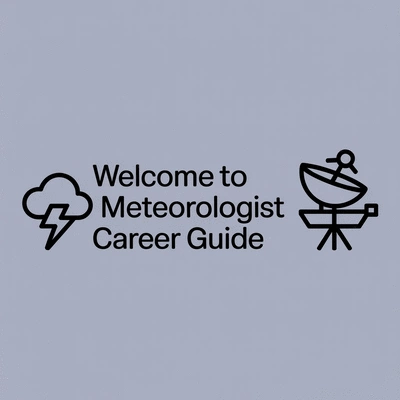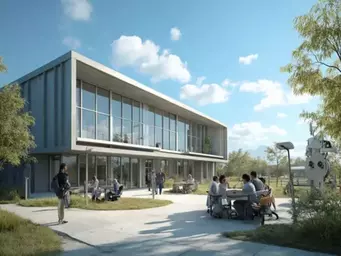The demand for meteorologists is expanding beyond traditional roles, creating diverse opportunities across various industries. As you explore this exciting field, consider how your interests align with the growing landscape of meteorology careers.
What You Will Learn
- Meteorology offers a wide range of career paths beyond forecasting, including roles in aviation, environmental science, and data analysis.
- The integration of AI and machine learning is reshaping how meteorologists predict weather patterns and analyze data.
- Skills in data science and programming are increasingly vital for success in meteorology careers.
- Networking with professionals in the field can provide mentorship opportunities and valuable insights into various meteorology roles.
- Engaging with professional organizations can enhance your career through resources, workshops, and networking events.
Exploring Diverse Meteorologist Career Paths
The field of meteorology offers a wide array of career opportunities beyond traditional forecasting. This visual highlights some of the key roles available to aspiring meteorologists.
Aviation Meteorologist
Assists in weather planning for flights, ensuring safety and efficiency.
Climate Scientist
Investigates long-term weather patterns and changes, crucial for environmental understanding.
Data Scientist (Weather)
Analyzes complex weather data to improve predictions and models.
Environmental Consultant
Addresses climate-related challenges for businesses and public sectors.
Weather Analyst
Interprets meteorological data to provide detailed weather assessments.
Remote Sensing Specialist
Utilizes satellite and radar data for atmospheric observations.
Meteorologist Career Paths: Understanding Diverse Opportunities
When most people think about a career in meteorology, they often picture someone standing in front of a green screen, delivering the daily weather forecast. However, the world of meteorology is much broader and more fascinating than that! I want to share how diverse and dynamic meteorologist career paths can be, highlighting opportunities that extend well beyond traditional forecasting roles. Whether you are just starting your journey or considering a career change, understanding these pathways is crucial.
As we delve into the various careers within meteorology, it's essential to recognize that the field is constantly evolving. New technologies, climate challenges, and interdisciplinary approaches are reshaping the roles available to aspiring meteorologists. I encourage you to keep an open mind and explore the breadth of options out there!
Introduction to Meteorology Careers Beyond Forecasting
Did you know that meteorologists play pivotal roles in sectors such as aviation, environmental science, and data analysis? The demand for weather expertise is growing, and with it, a variety of exciting career opportunities. According to the U.S. Bureau of Labor Statistics, the job outlook for atmospheric scientists, including meteorologists, is projected to grow, reflecting this increasing demand. Here are some key roles you might not have considered:
- Aviation Meteorologist: Assists in weather planning for flights.
- Data Scientist: Analyzes complex weather data to improve predictions.
- Climate Scientist: Investigates long-term weather patterns and changes.
- Environmental Consultant: Addresses climate-related challenges for businesses.
These roles highlight a fraction of the diverse career paths available in meteorology. In Australia, where I operate the Meteorologist Career Guide, I strive to empower individuals by providing insights into these paths and connecting them with resources to succeed.
The Evolving Landscape of Meteorologist Roles
The landscape of meteorological roles is not static; it’s continually reshaped by advancements in technology and our understanding of climate change. I’ve witnessed firsthand how the integration of data science and programming skills is becoming increasingly vital in our field. The National Weather Service emphasizes that a strong background in mathematics, physics, and computer science is crucial for many meteorological careers. If you're interested in how these changes may impact your career choices, here's a look at some trends:
- The rise of AI and machine learning for weather prediction.
- Increased emphasis on environmental sustainability in forecasting.
- Demand for interdisciplinary skills, combining meteorology with fields like computer science.
- Growth in public health meteorology, focusing on the connections between weather and health outcomes.
By understanding these trends, you can position yourself effectively in a competitive job market. Embrace the changes and consider how they align with your personal interests and goals in meteorology!
Pro Tip
To stand out in the competitive field of meteorology, consider developing a unique skill set that combines traditional meteorological knowledge with data science and technology. Mastering programming languages like Python or R can significantly enhance your data analysis capabilities, making you a valuable asset in various meteorological roles.
Frequently Asked Questions (FAQs) About Meteorology Careers
- What types of careers are available in meteorology beyond weather forecasting?
- Beyond traditional forecasting, meteorology offers diverse roles such as aviation meteorologist, climate scientist, data scientist (weather), environmental consultant, weather analyst, and remote sensing specialist.
- How is technology impacting meteorology careers?
- Technology, particularly AI and machine learning, is increasingly important for weather prediction and data analysis. These advancements are creating new roles that require skills in data science and programming.
- What skills are becoming essential for aspiring meteorologists?
- In addition to foundational meteorological knowledge, skills in data science, programming (e.g., Python, R), and interdisciplinary approaches are becoming vital for success in the evolving field.
- How can networking help in a meteorology career?
- Networking with professionals through platforms like LinkedIn or industry events can provide mentorship opportunities, valuable insights into various roles, and potential job connections.
- What role do professional organizations play in career advancement?
- Professional organizations like the American Meteorological Society (AMS) offer resources such as job boards, webinars, workshops, and networking events, which are crucial for professional growth and staying updated on industry trends.
Summarizing the Pathways of Meteorologist Careers
As we explore the vast landscape of meteorology careers, it’s clear that opportunities extend far beyond traditional forecasting. This field encompasses a variety of roles that cater to different interests and skill sets. From aviation meteorologists ensuring safe flights to climate scientists tackling global climate challenges, the pathways are diverse and exciting!
Here are some of the key career options you might consider:
- Aviation Meteorologist
- Climate Scientist
- Weather Analyst
- Data Scientist
- Environmental Consultant
- Remote Sensing Specialist
Each of these roles plays a vital part in understanding and addressing the complexities of our atmosphere. I encourage you to think about which of these paths resonates with your interests and aspirations!
Encouragement for Aspiring Meteorologists to Explore Diverse Roles
If you're contemplating a career in meteorology, I want you to remember that your journey can be uniquely tailored to your passions. Embracing the variety of roles available will not only enhance your understanding of weather science but also empower you to make a meaningful impact in the field. The possibilities are endless!
Whether you're drawn to data analysis, environmental consulting, or software development, each role contributes to a more comprehensive understanding of our climate system. Don't hesitate to explore and connect with professionals in these areas—you might discover a niche that sparks your enthusiasm!
Next Steps: Taking Action on Your Meteorology Career Path
Resources for Further Exploration in Meteorology Careers
To help you navigate your path in meteorology, I've compiled a list of resources that you might find useful:
- Online courses in meteorology and data science
- Professional organizations like the Australian Meteorological and Oceanographic Society
- Internship opportunities offered by universities and research institutions
- Networking events and conferences to meet industry professionals
These resources can provide you with valuable insights and connections that will enhance your understanding of career options in meteorology.
Connecting with Professionals in the Meteorological Field
Networking is an essential part of advancing your career in meteorology. I encourage you to reach out to professionals in the field through social media platforms like LinkedIn or attend local events. Engaging with current meteorologists can lead to mentorship opportunities and valuable advice on navigating your career journey.
Consider joining forums or online communities dedicated to meteorology. Sharing experiences and learning from others will not only enrich your knowledge but also inspire you to pursue your passions!
Engaging with Meteorology Professional Organizations for Career Growth
Being a part of professional organizations can significantly benefit your career. For instance, the American Meteorological Society (AMS) provides valuable guidance on educational requirements and career paths. Here are a few organizations to consider:
- Australian Meteorological and Oceanographic Society (AMOS)
- World Meteorological Organization (WMO)
- American Meteorological Society (AMS)
These organizations offer resources such as job boards, webinars, workshops, and networking events that can help you grow professionally in meteorology. Getting involved can also open up opportunities for collaboration and further education!
Recap of Key Points
Here is a quick recap of the important points discussed in the article:
- Meteorology offers diverse career paths beyond traditional forecasting, including roles in aviation, data science, and environmental consulting.
- The evolving landscape of meteorology emphasizes the integration of technology, such as AI and data science, in weather prediction and analysis.
- Aspiring meteorologists should explore various resources and connect with professionals to enhance their understanding and career prospects.
- Joining professional organizations can provide valuable networking opportunities and access to resources for career growth.
- Exploring different roles within meteorology can lead to a fulfilling career tailored to individual interests and skills.









